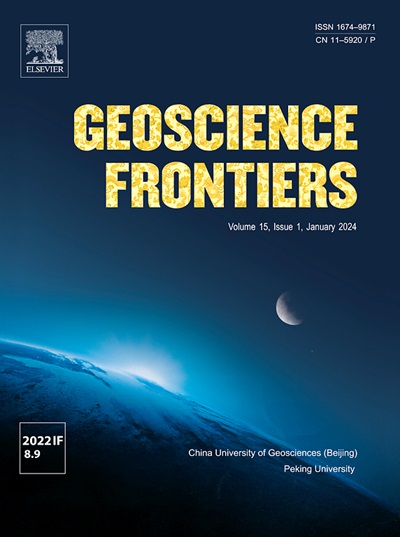绿色技术的生命周期分析:评估环境政策对碳排放和能源效率的影响
IF 8.9
1区 地球科学
Q1 GEOSCIENCES, MULTIDISCIPLINARY
引用次数: 0
摘要
环境污染日益严重的趋势突出表明,需要更多地获得绿色技术和清洁能源,以减轻环境压力。本研究旨在量化气候缓解技术,特别是与环境技术有关的技术,对环境质量和经济发展的影响。利用Westerlund协整、FGLS和Granger因果关系技术,对经济合作与发展组织(OECD) 19个成员国的环境相关技术、分类能源使用、二氧化碳排放和环境政策严格程度之间的关系进行了分析。研究结果表明,化石燃料使用的增加导致碳排放的增加。同样,可再生能源的使用也会增加碳排放,而与环境有关的技术对环境质量有积极影响。相比之下,更严格的环境政策对二氧化碳排放有负面影响。发现了单向因果关系,即与环境有关的技术、可再生能源的采用和环境政策的严格程度影响二氧化碳排放,而不是受到它们的影响。这些发现强调了与环境有关的技术在提高环境质量和经济生产力方面的重要性。鼓励决策者将重点放在为研究分配资源、建立强有力的监管框架、促进合作、促进教育和提高认识以及为向减缓气候变化技术过渡的部门提供支持等方面。本文章由计算机程序翻译,如有差异,请以英文原文为准。

Life cycle analysis of green technologies: Assessing the impact of environmental policies on carbon emissions and energy efficiency
A growing trend in environmental contamination has highlighted the need for greater access to green technologies and clean energy to alleviate environmental stress. This study seeks to quantify the impact of climate mitigation technologies, particularly those related to environmental technology, on environmental quality and economic development. The relationship between environment-related technologies, disaggregated energy use, carbon dioxide emissions, and the stringency of environmental policies was analyzed using Westerlund co-integration, FGLS, and Granger causality techniques across 19 member countries of the Organization for Economic Co-operation and Development (OECD). The findings show that an increase in fossil fuel use leads to a rise in carbon emissions. Similarly, the use of renewable energy also contributes to higher carbon emissions, while environment-related technologies have a positive impact on environmental quality. In contrast, stricter environmental policies have a negative effect on carbon dioxide emissions. A one-way causality was identified, with environment-related technologies, renewable energy adoption, and environmental policy stringency influencing carbon dioxide emissions, rather than being influenced by them. These findings underscore the significance of environment-related technology in enhancing both environmental quality and economic productivity. Policymakers are encouraged to focus on allocating resources for research, establishing robust regulatory frameworks, fostering collaboration, promoting education and awareness, and providing support for sectors transitioning toward climate change mitigation technologies.
求助全文
通过发布文献求助,成功后即可免费获取论文全文。
去求助
来源期刊

Geoscience frontiers
Earth and Planetary Sciences-General Earth and Planetary Sciences
CiteScore
17.80
自引率
3.40%
发文量
147
审稿时长
35 days
期刊介绍:
Geoscience Frontiers (GSF) is the Journal of China University of Geosciences (Beijing) and Peking University. It publishes peer-reviewed research articles and reviews in interdisciplinary fields of Earth and Planetary Sciences. GSF covers various research areas including petrology and geochemistry, lithospheric architecture and mantle dynamics, global tectonics, economic geology and fuel exploration, geophysics, stratigraphy and paleontology, environmental and engineering geology, astrogeology, and the nexus of resources-energy-emissions-climate under Sustainable Development Goals. The journal aims to bridge innovative, provocative, and challenging concepts and models in these fields, providing insights on correlations and evolution.
 求助内容:
求助内容: 应助结果提醒方式:
应助结果提醒方式:


